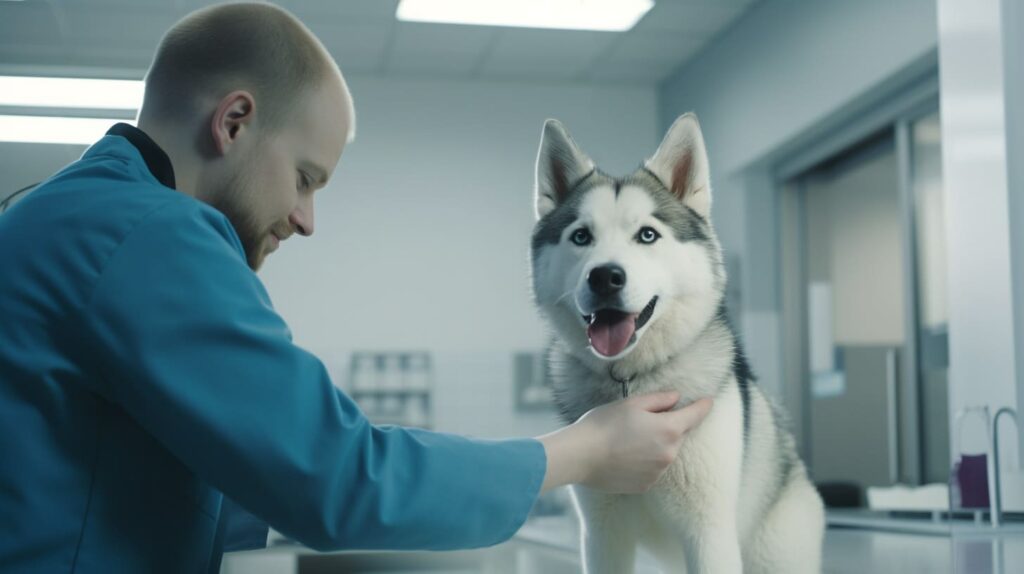One crucial aspect of Husky care is a proper vaccination schedule. This guide will walk you through the essential vaccination schedule for your Husky, so that it can live a long and vibrant life.
Understanding Vaccinations
Before diving into the vaccination schedule, let’s understand what vaccinations are and why they are vital for your Husky. Vaccinations are preventive measures that help protect your dog from various diseases caused by viruses or bacteria. They work by stimulating the immune system to produce antibodies against specific diseases, providing immunity.
Core Vaccinations
- Distemper: Canine distemper is a severe viral disease that affects a Husky’s respiratory, gastrointestinal, and nervous systems. Distemper vaccinations are typically administered in a series during puppyhood and then given as boosters.
- Parvovirus: Parvovirus is highly contagious and can be deadly, especially in puppies. Vaccinating against it is crucial, and puppies receive a series of shots starting at around 6 to 8 weeks.
- Rabies: Rabies is a fatal disease that can affect both dogs and humans. It’s usually required by law to vaccinate your Husky against rabies, and it’s typically given as a single shot.
Non-Core Vaccinations
While core vaccinations are essential, non-core vaccines are given based on your Husky’s lifestyle and environment. These may include:
- Bordetella (Kennel Cough): If your Husky frequents places like boarding kennels or dog parks, a bordetella vaccine might be recommended.
- Lyme Disease: If you live in an area where Lyme disease is prevalent, your veterinarian may recommend this vaccine.
- Leptospirosis: This bacterial disease can be transmitted to dogs from contaminated water or wildlife. If your Husky spends time outdoors in such environments, this vaccine might be suggested.
Creating a Vaccination Schedule
One of the most critical aspects of Husky care is establishing a proper vaccination schedule. A well-thought-out schedule ensures that your Husky is protected against potentially life-threatening diseases while minimizing any unnecessary vaccinations. Here’s a closer look at how to create a tailored vaccination plan for your beloved companion.
Consult Your Veterinarian: The first step in setting up a vaccination schedule is to consult with your veterinarian. Your vet will consider several factors to determine which vaccines your Husky needs and when they should be administered. These factors include your Husky’s age, health status, lifestyle, and the prevalence of specific diseases in your region.
Puppy Vaccination Series: Puppies typically receive a series of vaccinations starting at around 6 to 8 weeks of age. This initial series helps boost their immunity to common diseases. Core vaccines like distemper and parvovirus are typically given during this time. These initial shots are administered every 3-4 weeks until your pup is around 16 weeks old.
Tailored Vaccination Plan: Your veterinarian will work with you to create a vaccination plan that suits your Husky’s specific needs. They may recommend non-core vaccines based on factors like your Husky’s exposure risk. For example, if your Husky frequents areas where kennel cough is prevalent, the bordetella vaccine might be suggested. Similarly, if you live in an area with a high incidence of Lyme disease, your vet may recommend the Lyme disease vaccine.
Booster Shots: Vaccination isn’t a one-and-done affair. Your Husky will need booster shots to maintain immunity against certain diseases. These booster shots are typically administered annually, but the frequency can vary depending on the vaccine and your location. Regular check-ups with your vet are crucial to ensure your Husky’s vaccinations are up to date.
Record Keeping: It’s essential to maintain accurate records of your Husky’s vaccinations. This helps you and your veterinarian track which vaccines have been given, when they were administered, and when boosters are due. Many veterinarians provide vaccination cards to help you keep organized.
Stay Informed: Keep yourself informed about any changes in vaccination recommendations or outbreaks of diseases in your area. Your veterinarian will be your best source of information in this regard. Being aware of any emerging health concerns allows you to make informed decisions about your Husky’s vaccinations.
In conclusion, creating a vaccination schedule tailored to your Husky’s needs is a crucial part of responsible pet ownership. It not only protects your furry friend from preventable diseases but also ensures their overall well-being. Always work closely with your veterinarian to develop and maintain a vaccination plan that is personalized to your Husky’s unique circumstances. This commitment to their health will help ensure a long and happy life for your beloved Husky.
Booster Shots
Booster shots are a vital component of your Husky’s vaccination schedule. While initial vaccinations provide a strong immune response, this immunity can wane over time. Booster shots help to reinforce your Husky’s defenses against specific diseases, ensuring long-term protection.
Frequency: The frequency of booster shots varies depending on the vaccine and your location. Typically, booster shots are administered annually for core vaccines, such as those protecting against distemper, parvovirus, and rabies. Non-core vaccines may have different schedules; consult with your veterinarian for guidance.
Importance: Booster shots serve to remind your Husky’s immune system about the diseases they were initially vaccinated against. This reminder helps maintain a robust defense, especially for diseases that might be prevalent in your area or have the potential for severe consequences.
Lifestyle Factors: Your Husky’s lifestyle also plays a role in determining booster shot frequency. For instance, if your Husky spends a lot of time in areas where ticks are common, your vet may recommend more frequent booster shots for tick-borne diseases like Lyme disease.
Veterinarian Consultation: Your veterinarian will be your best guide in determining when booster shots are due. They will keep records of your Husky’s vaccinations and send reminders when it’s time for boosters. Regular vet visits allow you to discuss any changes in your Husky’s lifestyle or health that might necessitate adjustments to the vaccination schedule.
Overall, booster shots are an essential part of maintaining your Husky’s immunity to preventable diseases. These regular check-ins with your vet not only ensure that your Husky remains protected but also provide an opportunity to address any other health concerns or questions you may have. Keeping your Husky up to date with their booster shots is a responsible and loving way to care for your furry friend.
Conclusion
Protecting your Husky through vaccinations is an essential part of responsible pet ownership. It shields them from potentially life-threatening diseases and ensures a longer, healthier life. Remember, always consult with your veterinarian to create a personalized vaccination schedule that suits your Husky’s specific needs.






